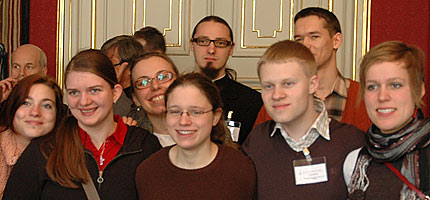© LWF/E.Neuenfeldt
14.03.2010
European Lutheran Churches Start Preparatory Consultation for Assembly
General Secretary Noko: “Europe Should Become More Hospitable”
BRATISLAVA, Slovak Republic/GENEVA, 14 March 2010 (LWI) – “Europe is a superpower, at least in terms of its economic power. What does that mean for the Lutheran churches, what potential do they have within this European space?”
The General Secretary of the Lutheran World Federation (LWF) Rev. Dr Ishmael Noko raised these questions in his opening address to the European preparatory consultation for the July 2010 LWF Eleventh Assembly. The pre-assembly meeting takes place, 13 - 17 March, in Bratislava, Slovak Republic.
Noko said these questions should also be discussed at the Eleventh Assembly in of which the theme is “Give Us Today Our Daily Bread.” The assembly will be held in Stuttgart, Germany, hosted by the Evangelical Lutheran Church in Württemberg.
Speaking to delegates from 35 European LWF member churches on 13 March, Noko asked: “Is Europe becoming a fortress?” In view of the worldwide reality of migration, “Europe should become more hospitable,” he suggested. He underlined the need for “creative spaces” for inter-religious dialogue.
Promoting Dialogue with the Southern Hemisphere
The general secretary spoke under the topic "Expectations from the European Contribution to the Assembly, and to the Wider Lutheran Communion.” He said another task for European Lutheran churches would be to promote dialogue with the southern hemisphere. Europe, he noted, could contribute its specific experience with “minority churches.”
Noko said the Stuttgart assembly will also focus on the diaconal challenges confronting Lutheran churches in Europe. Churches should provide models on how to address ethical and moral challenges, he noted, saying he expected the European churches to be more outspoken on justice issues.
Five “Categories” of Churches
At the delegates’ request, the general secretary divided the worldwide Lutheran communion into five “categories” of churches, according to their theological traditions. There are churches of the historical Reformation, whose theological formation is based on university training; churches that “emigrated” from universities, for example, in the USA, of which ecclesiastical training takes place in seminaries, with a strong sense of being Lutheran; missional churches with a pietistic tradition; churches springing up as a result of local mission; and churches which have emerged directly from migration movements.
Earlier during the Bratislava consultation opening worship, Noko recalled Jesus’ Last Supper with his disciples, and underlined: “We have become God’s children by grace through Christ’s death and resurrection.” The general secretary urged the delegates to continue on the path toward the Stuttgart assembly in a spirit of harmony grounded in this knowledge.
Bishop Klátik: Affluence Does Not Necessarily Bring People to God
Greeting the LWF pre-assembly participants, Bishop Dr Miloš Klátik of the host church, Evangelical Church of the Augsburg Confession in the Slovak Republic, expressed his wish for “wisdom and God’s blessing, so that you can fill the Lord’s Prayer with Christian content.” Describing the development of his church before and after the political change in Central and Eastern Europe, Klátik stated: “Our church senses that affluence does not necessarily bring people to God.”
LWF youth representatives who held their conference the day before, summarized their message in the keywords “Identity – Communion – Credibility,” presented to the pre-assembly gathering in the form of a joint prayer. (538 words)
Journey | Europe Pre-Assembly Consultation

